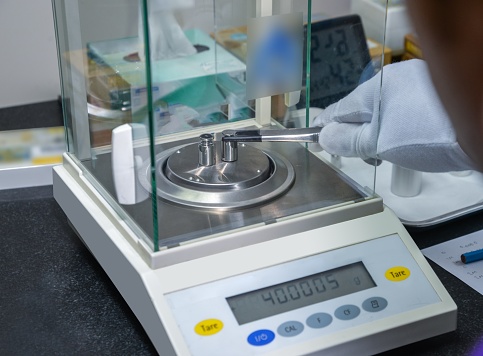Accreditation of Medical Laboratories
Accreditation of medical laboratories According to International Standard ISO 15189
Accreditation of medical laboratory examinations according to ISO 15189 is becoming important as a management tool and a means to create confidence in results.
Medical laboratory services are essential in the diagnosis and assessment of the health of patients. Their services encompass arrangements for requisition, patient’s preparation, patient’s identification, collection, transportation, storage, processing and examination of clinical samples, together with subsequent result validation, interpretation, reporting and advice. Medical laboratory services should therefore meet the needs of all patients, clinical personnel responsible for patient care and any other interested parties.
The laboratory’s aim is to not only to provide accurate results, but to do so for the right patient within a meaningful timeframe with regard to clinical management, using appropriate laboratory procedures and with respect for ethics, confidentiality and the safety of the patient.
To demonstrate the quality and reliability of their services, medical laboratories can seek Accreditation to ISO 15189: Medical laboratories – Particular requirements for quality and competence, an internationally recognized standard that contains the requirements necessary for diagnostic laboratories to demonstrate their competence to deliver reliable services.
Accreditation of Calibration and Testing Laboratories
Accreditation of calibration & testing laboratories According to International Standard ISO/IEC 17025 enables laboratories to demonstrate that they operate competently and generate valid results, thereby promoting confidence in their work both nationally and around the world.
It also helps facilitate cooperation between laboratories and other bodies by generating wider acceptance of results between countries. Test reports and certificates can be accepted from one country to another without the need for further testing, which, in turn, improves international trade.
Who is ISO/IEC 17025 For?
ISO/IEC 17025 is useful for any organization that performs testing, sampling or calibration and wants reliable results. This includes all types of laboratories, whether they be owned and operated by government, industry or, in fact, any other organization. The standard is also useful to universities, research centers, governments, regulators, inspection bodies, product certification organizations and other conformity assessment bodies with the need to do testing, sampling or calibration.
Benefits of ISO/IEC 17025 Laboratory Management System
By becoming an ISO 17025 certified professional, you will be able to:
- Improve your reputation
- Create new business connections
- Gain competitive advantage
- Increase laboratory effectiveness
- Gain access to more contracts for testing and calibration
- Offer proficiency on improving work processes
- Offer more reliable and efficient lab testing and results
- Achieve customer reliability
Accreditation of Inspection Bodies
The inspection body will be responsible for inspection the design of the product or product itself, service, operation or factory, to determine their compliance with certain requirements or standards.
The inspection body should be officially registered and operate legally, and holding an official documents explain its processes and the technical scope of its activity. ISO/IEC 17020:2012 “Conformity assessment — Requirements for the operation of various types of bodies performing inspection” determines the specific requirements of the competence of the inspection body and the integrity and impartiality of their inspection activities, This applies to inspection body of type A, B or C, As mentioned in ISO/IEC 17020: 2012 standard.
The accreditation body is officially accredited by accreditation body to demonstrate the integrity and technical competence of inspection body to perform specific types of inspection activities in accordance with ISO/IEC 17020 standard specifications, According to this provision, customers and beneficiaries are confident in the efficiency and quality of inspection services.
Benefits of Applying ISO 17020 and Obtaining ISO 17020 Accreditation
- Improving efficiency, productivity and efficiency in all inspection and inspection operations
- Improving motivation, collaboration, teamwork and quality proficiency including the efficiency of individuals and inspectors
- Increased confidence in inspection results and decisions, And increase the culture of the staff and inspectors who do the work
- Increased control and control of all inspection body operations and activities
- Reduce time and money lost due to reducing or eliminating the need for re-inspection/re-work, etc.
- Provide tips on data analysis as well as keeping the perfect record.
- Provide better guidance and control for equipment maintenance, and keeping inspection records, And so on.
- Get the customer confidence in results as well as reports and increase customer confidence as well as market share.
- A better image for inspection bodies as quality inspection bodies in the global market.
- Recognition and credibility worldwide.
- Enjoy a screening body certified by ISO 17020: 2012 with a clear superiority over competitors.
Inspections Interested in Obtaining International Accreditation
- Inspections of products and electrical extensions
- Inspections of oil and gas facilities
- Inspections of factories, hotels, hospitals and companies
- Inspections of mechanical machinery, and non-destructive tests.
- Meat, dairy and other food products testers
- All parties working in the field of inspection and inspection
Accreditation of Product Certification Bodies
Accreditation of Product Certification is a service whereby an independent third party provides a confirmation that a product meets the requirements of its related standard specification or adopted regulations.
The aim of ISO 17065 certification ensures the competence of an accreditation body in providing certification for the quality of products, processes, and services.
What Products, Processes, and Services does the Accreditation Refer to?
Product: Includes a process result, such as software, hardware, or any service or processed materials.
Service: An intangible result of at least one activity conducted in conjunction with a supplier and a customer.
Process:Includes linked or interrelated activities that transform inputs into outputs. For example, manufacturing processes, welding engineering processes, and food production processes.
ISO/IEC 17065 accreditation builds trust and confidence among all interested parties in the quality of the product and its compliance with all regulatory standards. The certification is useful for different parties and organizations, including:
- Certification bodies’ clients
- Government authorities
- Customers of the organization being accredited
- Consumers and other public members
- Non-government organizations
Product Certification Benefits
- Winning Consumer confidence in the certified products resulting into increased market share and consumers’ ability to identify the products that conform to quality standards thus making quick decisions in favor of quality products.
- Protection against unfair competition from inferior products on the market through: easy identification of the products that conform since they carry the Quality Mark.
- The product is presented with a better image in both national and international markets resulting into: mutual recognition schemes where countries recognize each other’s products thus easing entry into regional and foreign markets; easy acceptance and promotion of new products in the markets; and safeguarding the image and reputation of the manufacturer.
- The Certification Scheme provides technical audit of product quality and process control procedures. This means that the Manufacturer gets technical advisory services and information at little cost that would otherwise be obtained at very high cost.
Accreditation of Person Certification Bodies
Accreditation of Person Certification Bodies According to International Standard ISO/IEC 17024
Accreditation of person certification bodies is responsible for grants competency certificates of person by evaluating qualification, training, experience, proven knowledge and related skills accordance with ISO/IEC 17024 and the certification scheme.
The certification schemes are designed to supplement the requirements included in the international standard ISO/IEC 17024, and requirements that the market needs or desires, or that are required by governments.
ISO/IEC 17024, serve as the basis for the recognition of the certification bodies for persons and the certification schemes under which persons are certified, in order to facilitate their acceptance at the national and international levels.
Benefits of Accreditation for Person Certification Bodies
- Valuable tool to prove proficiency/competency of the person.
- To fill the positions with accredited certified person not only qualified person.
- Ensure effectiveness training and real experience accredited certified persons because they are the top most important characteristics when selecting a candidate.
- Defines the requirements that must be met by the participants in the examination process.
- It helps in development and maintenance of a certification scheme for persons.
- Verifying compliance with training standards for professionals, experts, etc.
- The accredited certified person becomes a one of certified professional’s community nationally and internationally.
Accreditation of Management System Certification Bodies
Accreditation of Management System Certification Bodies Accreditation According to International Standard ISO/IEC 17021-1
ISO 17021 is an International Standard that provides Certification Bodies (CB) with a set of requirements that will enable them to ensure that their management system certification process is carried out in a competent, consistent and impartial manner.
The Certification Bodies (CB) granting certificates of conformity for the systems that show that the specific systems meet specific requirements, such as those contained in the specific standard, for example:
- Quality Management Systems ISO 9001: 2015
- Environmental Management Systems ISO 14001: 2015
- Occupational Safety and Health Management Systems ISO 45001: 2018
- Food Safety Management Systems ISO 22000: 2018
- Food Safety Systems Certification FSSC 22000 V5.1: 2019
- Energy Management Systems ISO 50001: 2018
- Medical Devices Management Systems ISO 13485: 2016
- Educational organizations management systems ISO 21001: 2018
- Information Security Management Systems ISO 27001: 2013
- Supply Chain Security Management Systems ISO 28001: 2007
- Business Continuity Management Systems ISO 22301:2019
Accreditation of Proficiency Testing Providers
Proficiency Testing is a laboratory comparison where many laboratories test or calibrate uniform samples and where results are subsequently compared and treated statistically.
Proficiency testing is a measurement or testing assignment carried out by several laboratories independently, the results obtained by one laboratory are compared with the results obtained by other laboratories which are common in most Proficiency Testing Schemes. The goal is to determine the performance of the participants under the same general conditions.
This approach gives the laboratories the opportunity to demonstrate their competence for testing.
Participation in proficiency tests such as interlaboratory comparisons provides laboratories with valuable insights into their performance and the reliability of their analysis results. Accredited proficiency testing providers have demonstrated that they have performed the interlaboratory comparisons in accordance with the requirements of ISO/IEC 17043
Benefits of Participating in Proficiency Test Providers Programs
- Ensure efficient performance.
- Identifying problems in the testing process and the procedures.
- Improving laboratory performance and training staff.
- Gaining trust from the beneficiaries in the services provided by the laboratory.
- Determining the accuracy and validity of test methods.
- Responding to the requirements of accreditation bodies and legislators.
- Provide additional risk management for laboratories.







